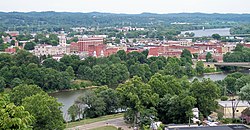Marietta, OH
| Marietta, Ohio | |
|---|---|
| City | |

Downtown Marietta in July 2007, including the Muskingum River (foreground) and the Ohio River (background right)
|
|
 Location of Marietta in Ohio |
|
 Location of Marietta in Washington County |
|
| Coordinates: 39°25′N 81°27′W / 39.417°N 81.450°WCoordinates: 39°25′N 81°27′W / 39.417°N 81.450°W | |
| Country | United States |
| State | Ohio |
| County | Washington |
| Government | |
| • Type | Mayor-council |
| • Mayor | Joe Mathews (D) |
| Area | |
| • Total | 8.75 sq mi (22.66 km2) |
| • Land | 8.43 sq mi (21.83 km2) |
| • Water | 0.32 sq mi (0.83 km2) |
| Elevation | 614 ft (187 m) |
| Population (2010) | |
| • Total | 14,085 |
| • Estimate (2012) | 14,027 |
| • Density | 1,670.8/sq mi (645.1/km2) |
| Time zone | Eastern (EST) (UTC-5) |
| • Summer (DST) | EDT (UTC-4) |
| ZIP code | 45750 |
| Area code(s) | 740, 220 |
| FIPS code | 39-47628 |
| GNIS feature ID | 1076339 |
| Website | http://www.mariettaoh.net/ |
Marietta is a city in and the county seat of Washington County, Ohio, United States. During 1788, pioneers to the Ohio Country established Marietta as the first permanent settlement of the new United States in the Territory Northwest of the River Ohio. Marietta is located in southeastern Ohio at the mouth of the Muskingum River at its confluence with the Ohio River. The population was 14,085 at the 2010 census.
It is the second-largest city in the Parkersburg-Marietta-Vienna, West Virginia-Ohio (part) Metropolitan Statistical Area. The private, nonsectarian liberal arts Marietta College is located here. It was a station on the Underground Railroad before the Civil War.
This is the site of the prehistoric Marietta Earthworks, a Hopewell complex more than 1500 years old, whose Great Mound and other major monuments were preserved by the earliest settlers in parks such as the Mound Cemetery.
The city was named in honour of Marie Antoinette, Queen of France; Marietta being an affectionate nickname for the Queen.
Succeeding Indian cultures lived along the Ohio River and its tributaries for thousands of years. Among them were more than one culture who built earthwork mounds, monuments which generally expressed their cosmology, often with links to astronomical events.
...
Wikipedia
